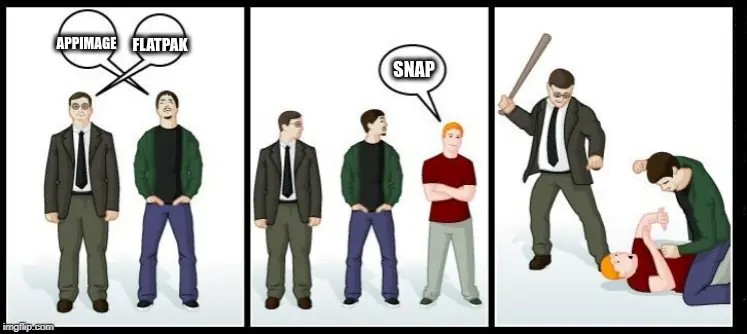this post was submitted on 16 Sep 2024
833 points (97.6% liked)
linuxmemes
20880 readers
7 users here now
I use Arch btw
Sister communities:
- LemmyMemes: Memes
- LemmyShitpost: Anything and everything goes.
- RISA: Star Trek memes and shitposts
Community rules
- Follow the site-wide rules and code of conduct
- Be civil
- Post Linux-related content
- No recent reposts
Please report posts and comments that break these rules!
founded 1 year ago
MODERATORS
you are viewing a single comment's thread
view the rest of the comments
view the rest of the comments

Linux noob here, can someone ELI5 why snaps are bad? And how does .deb works?
I don't think snaps are bad (and when someone tries to explain why they are, about 85% of the time they say something wrong enough that I suspect they're probably just parroting someone else rather than actually knowing what's going on). It's sad, because if we could get rid of the bullshit we could actually have decent discussions about the benefits and shortcomings of snaps (and how to fix those shortcomings).
On the .deb front: it's a package format made by Debian. Each archive contains a data tarball, which has the files in the package in their full structure from
/, and a control tarball, which contains metadata such as name, version and dependencies as well as pre-install, pre-remove, post-install and post-remove scripts, which are used doing any setup or removal work that can't be done just by extracting or deleting the files.The upside of deb files is that they tend to be pretty small. The downside is that this typically comes from having a tight coupling to library versions on the system, which means upgrading a library can break seemingly unrelated things. (This is why you get warnings like this page: https://wiki.debian.org/DontBreakDebian) Many third party distributors (e.g. Google with Chrome) take care of this by packaging most dependencies inside the deb, inflating the size.
Another major difference between packages like debs and rpms and newer formats like snaps and flatpaks is that the latter have confinement systems to prevent apps from having full access to your system.
For me, it was
snapdtaking ~2.5GiB of RAM.